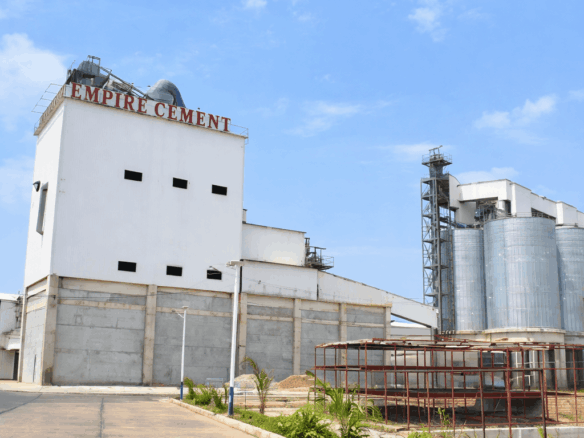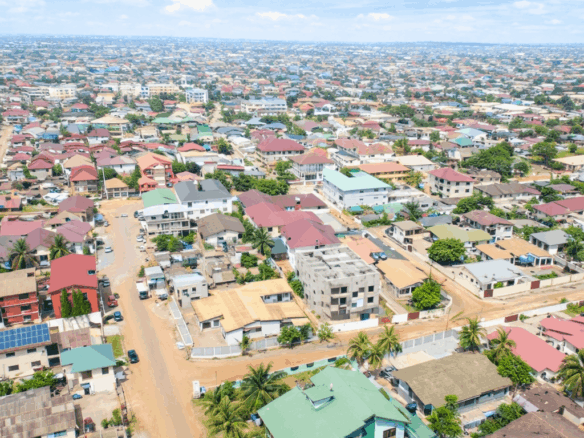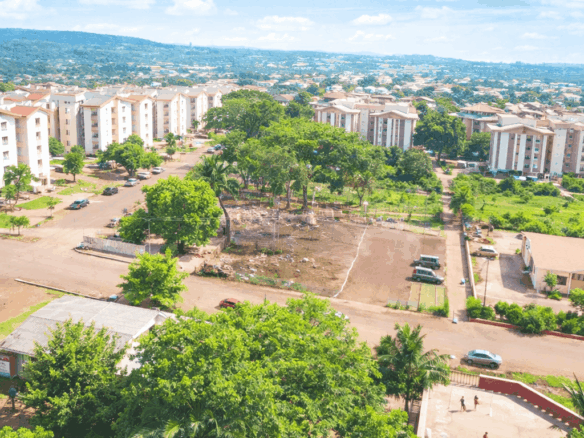Ghana’s real estate market has experienced significant growth and transformation over the past few years, driven by factors such as urbanisation, a growing middle class, and increased foreign investment. As we look ahead to the state of the market in 2025, it’s clear that property investment in Ghana remains an attractive prospect for both local and international investors seeking to create real estate wealth in a dynamic and rapidly developing economy.
In this blog post, we’ll explore the key trends shaping Ghana’s real estate market, examine the most promising investment opportunities across different sectors, and discuss strategies for maximising ROI while navigating potential challenges and risks.
The Current State of Ghana’s Property Market
Recent real estate market reports and statistics paint a picture of a robust and resilient sector poised for continued expansion in the coming years. Despite the global economic headwinds caused by the COVID-19 pandemic, Ghana’s property market has demonstrated remarkable stability, with steady demand for both residential and commercial properties. According to the Bank of Ghana, the average price of a two-bedroom house in Accra increased by 8.2% year-on-year in Q3 2024, while rental yields across major cities remained attractive at around 7-9%.
This positive outlook is underpinned by several key factors, including:
- Rapid urbanisation: Ghana’s urban population is projected to reach 70% by 2030, driving demand for housing and infrastructure.
- Growing middle class: As incomes rise and access to mortgage financing improves, more Ghanaians are entering the property market.
- Government initiatives: Programs such as the National Housing and Mortgage Fund (NHMF) are supporting the development of affordable housing.
- Foreign investment: Ghana continues to attract significant inflows of foreign capital into its real estate sector, thanks to its stable political environment and favourable investment climate.
Major Trends Shaping the Market
Looking ahead to 2025 and beyond, several key trends are set to shape the trajectory of Ghana’s real estate market:
-
Technological Disruption
The rapid adoption of digital technologies is transforming how properties are bought, sold, and managed in Ghana. Online platforms like Ghana Property Finder are making it easier than ever for buyers and investors to access a wide range of listings, while virtual tours and digital transactions are streamlining the purchasing process. Property developers are also harnessing tools like 3D printing and building information modelling (BIM) to deliver projects faster and more efficiently.
- Transit-Oriented Development
With traffic congestion a major challenge in Ghana’s cities, there is a growing trend towards transit-oriented development (TOD) – the creation of compact, walkable, mixed-use communities centred around public transport nodes. Properties located in TOD zones are likely to command a premium in terms of rental income and capital appreciation, as more Ghanaians seek out convenient and car-free lifestyles.
Investment Opportunities and Hotspots
Ghana’s real estate market offers a diverse range of investment opportunities across different sectors and regions. Here are some of the most promising areas to consider:
Residential:
- Affordable housing: With a deficit of over 2 million units, there is strong demand for low- and middle-income housing in Ghana’s major cities. Investors can tap into this market by partnering with government agencies or private developers to deliver large-scale affordable housing projects.
- Student accommodation: Ghana’s growing student population presents opportunities in the purpose-built student accommodation (PBSA) sector. With many tertiary institutions facing a shortage of on-campus housing, private investors can develop and operate high-quality student residences near major universities.
- Luxury apartments: There is also a growing market for upscale residential properties, particularly among Ghana’s affluent diaspora and expatriate communities. Developments in prime locations like Cantonments, Airport Residential Area, and East Legon are commanding high rental yields and strong resale values.
Commercial:
- Office space: Demand for grade-A office space remains robust, driven by the expansion of Ghana’s service sector and the entry of multinational corporations. Investors can target prime locations in Accra like Airport City and Ridge for maximum returns.
- Retail: Ghana’s retail sector is experiencing rapid growth, with several new malls and shopping centres under development. Investors can capitalize on this trend by acquiring or developing retail properties in high-traffic locations.
- Hospitality: Ghana’s tourism industry is booming, creating opportunities in the hotel and serviced apartment sector. Investors can target both business and leisure travellers by developing properties near major attractions, business districts, and transport hubs.
Industrial:
- Warehousing and logistics: As Ghana’s economy grows and e-commerce expands, there is increasing demand for modern warehousing and logistics facilities. Investors can target strategic locations near ports, airports, and major highways for maximum connectivity.
- Manufacturing: The government’s “One District, One Factory” initiative is driving the development of new industrial parks and special economic zones across the country. Investors can tap into this program by acquiring land or developing turnkey factories for lease to local and international manufacturers.
Emerging Regional Hotspots:
While Accra remains the primary focus for most investors, several regional cities and towns are emerging as attractive destinations for real estate investment. These include:
-
Kumasi:
Ghana’s second-largest city is experiencing rapid growth, driven by its thriving manufacturing and agriculture sectors. The city’s expanding middle class is driving demand for housing, retail, and office space.
-
Takoradi:
As the hub of Ghana’s oil and gas industry, Takoradi is attracting significant investment in both residential and commercial properties. The city’s port expansion project is also driving demand for warehousing and logistics facilities.
-
Tamale:
The capital of Ghana’s Northern Region is poised for growth, thanks to its strategic location and the government’s plans to develop it as a hub for agro-processing and light manufacturing. Investors can target opportunities in housing, retail, and industrial properties.
Navigating Challenges and Risks
While Ghana’s real estate market offers significant potential for returns, investors must also navigate a range of challenges and risks. These include:
-
Land tenure issues:
Acquiring land with a clean title can be a complex and time-consuming process in Ghana, requiring thorough due diligence and legal expertise.
-
Infrastructure gaps:
Many parts of Ghana still lack adequate infrastructure, including roads, power, and water supply, which can impact the viability of real estate projects.
-
Financing constraints:
Access to affordable mortgage and construction financing remains limited, particularly for smaller developers and individual investors.
To mitigate these risks, investors should work with reputable local partners, conduct thorough market research, and secure professional advice from legal, financial, and technical experts. The government is also taking steps to address these challenges, such as digitizing land records, investing in infrastructure, and reforming the mortgage sector.
Conclusion
Ghana’s real estate market in 2025 presents a wealth of opportunities for savvy investors looking to create long-term wealth and capitalize on the country’s rapid economic growth. By understanding the key trends shaping the market, identifying the most promising investment hotspots, and navigating potential challenges and risks, investors can position themselves for success in this dynamic and rewarding sector.
To kickstart your real estate investment journey in Ghana, explore the wide range of listings available on Ghana Property Finder. Our platform connects buyers, sellers, and renters across the country, providing access to up-to-date market data, property details, and expert insights to help you make informed investment decisions.
Whether you’re looking for a residential apartment in Accra, a commercial office in Kumasi, or an industrial warehouse in Takoradi, Ghana Property Finder has you covered? Start browsing our listings today and take the first step towards building your real estate wealth in Ghana!
FAQs
-
What are the most promising sectors for real estate investment in Ghana?
The residential, commercial, and industrial sectors all offer significant opportunities, depending on your investment goals and risk appetite. Affordable housing, student accommodation, luxury apartments, office space, retail, hospitality, warehousing, and manufacturing are some of the most promising sub-sectors.
-
Where are the emerging regional hotspots for real estate investment in Ghana?
While Accra remains the primary focus for most investors, cities like Kumasi, Takoradi, and Tamale are emerging as attractive destinations, driven by factors such as economic growth, infrastructure development, and government initiatives.
-
What are the key risks and challenges facing real estate investors in Ghana?
Land tenure issues, infrastructure gaps, and financing constraints are some of the main challenges investors must navigate. Working with reputable local partners, conducting thorough due diligence, and securing professional advice can help mitigate these risks.
-
How is technology shaping Ghana’s real estate market?
Digital platforms like Ghana Property Finder are making it easier for buyers and investors to access listings and market data, while tools like 3D printing and building information modelling are transforming property development and construction.
-
What role does sustainability play in Ghana’s real estate market?
There is growing demand for environmentally friendly and energy-efficient buildings in Ghana, as investors and occupiers seek to reduce costs, enhance value, and mitigate climate risks. Sustainable features like solar power, rainwater harvesting, and natural ventilation are becoming increasingly common in new developments.






